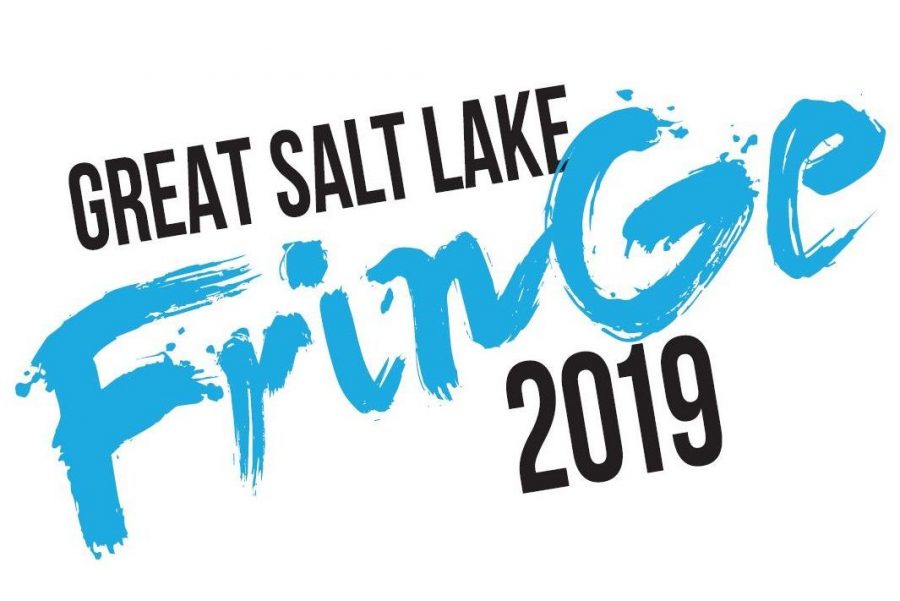Fringe’s ‘Telephone:’ A Contemporary Parable on Faith Worth Seeing
(Courtesy of Great Salt Lake Fringe.)
August 22, 2019
Those unfamiliar with independent theater may imagine it as something along the lines of a certain bit from an episode of “Friends” where protagonist Chandler Bing is uncomfortably trapped in a lone front seat for a one-woman show — aptly titled “Why Don’t You Like Me?”— and the starring actress loudly monologues about the existential agonies of menstruation to him without the promise of sweet release of any foreseeable end. The gag is funny, but it also relies on the stereotype that independent theater is too edgy to entertain and that “experimental” equates to overworked and poorly done. Not that progressive, challenging or provocative subject matter can’t carry a story forward on its own or that bad theater is nowhere to be found, but this conceived image in no way resembles a picture of independent theater done right or at its best. Real art is worth making the trip to go out, see and genuinely enjoy.
Fringe’s fantasy piece “Telephone,” by the newly upcoming Comet Sweeper Theatre, was a wonderful instance of real art. I went into it with amiable but few expectations. Mostly, I was looking to see something which was original and held my attention. However,”Telephone” accomplished more than this. It reminded me why I love theater — particularly black box theater — in the first place. With only a handful of people, a minimalist set and thoughtful writing, it’s not only possible that somebody else’s story can come to life in your heart, but is also likely to be carried out the door and pondered that same night. This, as with all of the best stage performances I’ve seen, is what the Fringe Festival advertises for itself, and what “Telephone” did for me.
The writing of the piece, by Comet Sweeper’s Claire Stucki, was evocative of Rod Serling’s “The Twilight Zone” in the best possible way, sharing close similarities with one story from the television series which follows a couple asking a spookily accurate mechanical fortune teller questions about their life. “Telephone” approaches this same idea, but from a different angle of corporatized providence that also gives the play aesthetics similar to those of the hit 2010 film “The Adjustment Bureau.” A dark room containing nothing but a replica of a charactered telephone booth, graffitied with tally marks and scrawlings such “What R U Waiting 4?”, provides the setting for the premise — in the middle of the Mojave Desert, there is a warped reality where anybody who passes through it will receive a call from the eponymous booth from the three fates, who are revealed to operate countless other stations like it across the world in order to enforce humanity’s happiness.
One woman, Jey (Eliza Shoell), has been told by these three so-called gods of fate to wait by this phone booth and effectively instruct passersby on how to use it until she receives her own destiny. In any case, at the start of the story, she’s been loyally but miserably waiting since the 1940s for her phone call without aging, able to do so, she says, through faith. Shoell conveyed her character particularly well and sells a sympathetic portrayal of a person totally resigned to hellish imprisonment, and her expressions and cues were on point. My only criticism of Jey was that I felt that her character might’ve been even more convincing had she used slang and turns of speech from her appropriate time period rather than modern speech, but this point is minor. For the most part, Jey was a believable heroine.
Jey’s convictions that the fates will guide her to a desirable life never wavers until a happy-go-lucky hiker, Sibyl (Kallie Filanda) comes by. Filanda gives Sibyl a humorous but nuanced vision of the ever-bubbly figure which other actors only ever seem to handle through overacting, fleshing out the stage’s rhythm with her banter with Shoell to where the play ran most smoothly whenever these two characters were together on stage.
When Sibyl receives a call and is told to leave her fiance, she refuses to follow the advice and the three gods step out from the phone booth and onto the stage for the first time. Resembling short-tempered receptionists rather than deities, the fates are nonetheless portrayed in an eerie and intimidating light by Catherine Mortimer, Madelyn Pettingill and Kim Garcia. They walk and speak in perfect unison, highlighting the impeccable direction and choreography of “Telephone.” Out of frustration, the fates allow Sibyl to lead an unhappy life and tell Jey to keep waiting for her destiny. Jey realizes that these gods ultimately do not care about the well-being of the individuals they serve and that she does not matter to them or their long-term goals to help humankind.
This twist is a blunt look at how many organizations that operate in the name of humanity — armies, nonprofits, churches, schools, companies, courts and so on — achieve good, certainly, but do so by feeding on their followers, sometimes to their detriment. The concept raises questions about the rallies, causes and goals by which we identify ourselves. The message of “Telephone” is poignant — loyalty neither surmounts to happiness nor faith, but to habits of desperation.
Fortunately, the play doesn’t end on a depressing note. After seeing Jey’s devastation, Sibyl invites Jey to come home with her so that they can solve the mysteries of their own lives together. This is the exact moment where the production transcended from just being good to displaying knowledge of genuine greatness. Jey decides to go and turns her back to the phone as it starts ringing.
Faith does exist, just not as Jey thought, and her impending call to her destiny came not from the fates themselves but from the gesture of a friend. If Comet Sweeper Theatre continues to put out more productions of equivalent quality to “Telephone,” you can’t afford to miss them.












